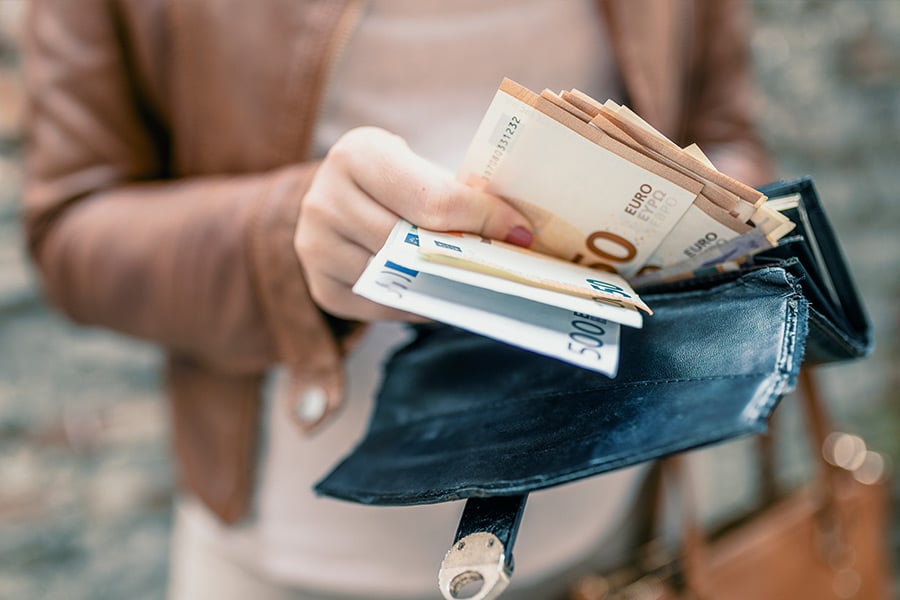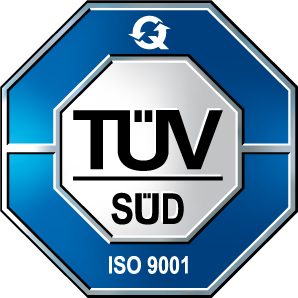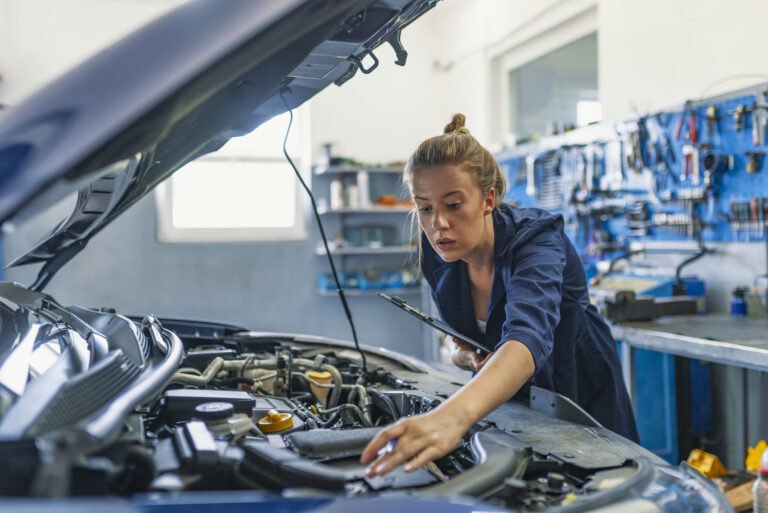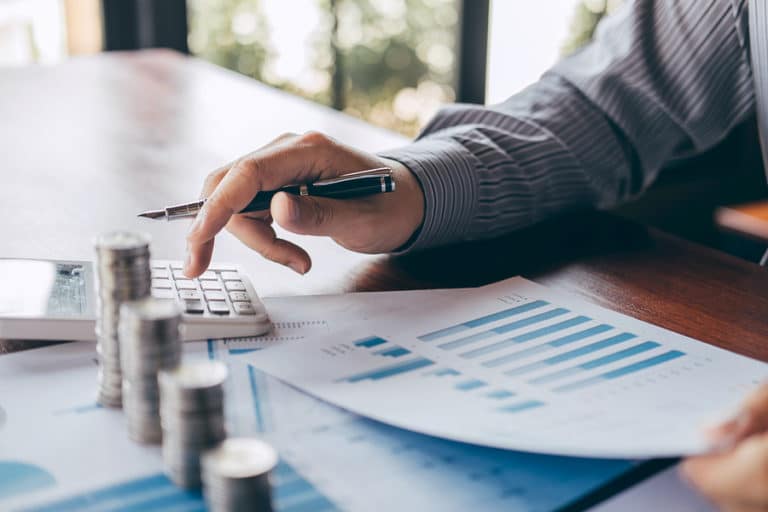You have accident damage and the person responsible for the accident contacts you with the suggestion: "I'll pay for it myself, let's keep the insurance company out of it." In retrospect, our customers are always particularly grateful when we save them from this.
In this guide, we explain whether you should agree to the other party paying for the accident damage yourself and what buying back the damage is all about.
- As the injured party, you are not obliged to agree if the other party wishes to pay for the accident damage themselves.
- The safest option, which is always available, is for the insurance company to pay out the claim first and the party responsible for the accident to buy it back at the end of the year.
- The licence plate number can be used to identify the other party's insurance company, even if the person responsible for the accident does not want to state it
Accident victims in your situation simply get the best support from fairforce.one.
Depending on the cause of the accident, customers receive an average of €4802 Additional payment
Callback within 5 minutes.
What options are there for paying for accident damage
The costs incurred for restoring your damaged vehicle after an accident are usually covered by the motor vehicle liability insurance of the party responsible for the accident.
Rule of thumb: The insurance company of the person who caused the accident pays the damages of the injured party.
This is why proof of motor vehicle liability insurance is required by law in Germany and is also a prerequisite for vehicle registration. This is to avoid an accident without insurance.
If, on the other hand, the damage is self-inflicted, i.e. damage to your own vehicle, your own fully or partially comprehensive insurance comes into play.
The person who caused the accident wants to pay for the damage himself - What does that mean?
When motor vehicle liability insurance pays a claim, it normally allocates the amount of compensation to be paid to the premiums for the coming years. In other words, the policyholder's premiums will be higher next year.
This effect is carried over into the coming years of the insurance contract and continues even if the car insurer is changed. For this reason, some policyholders try to pay for damage they have caused themselves out of their own pocket - i.e. without involving their insurance company. This option exists in principle, but is not recommended from the injured party's point of view.
In the first step, it is always recommended to settle the claim via the insurance company. At the end of the year, the at-fault party can exercise their right to buy back the claim and reimburse their insurance company for the "advance payment". This makes it easy to achieve the goal of avoiding downgrading.
What are no-claims classes and downgrades?
The system of premium discounts for claim-free years, which is still common in Germany, encourages policyholders to avoid claiming insurance benefits for as long as possible. The insurance company "thanks" them by allocating increasing discounts, which are expressed in SF classes, short for no-claims classes.
Rule of thumb: The higher the SF class, the greater the discount on the insurance premium.
Downgrading in this case means that you lose the discounts you have acquired through claim-free years.
Specific calculation of the premium increase Each insurance company has its own downgrading tables.
SF classes are only available for third-party liability and fully comprehensive insurance, but not for partially comprehensive insurance.
What should you do if the other party wants to settle the accident without insurance?
Our experience from many thousands of accident settlements and the feedback from most of those affected in this situation leads to a clear recommendation:
If you agree to "payment out of your own pocket", ALWAYS use the support of an independent regulator!
An independent specialist will draw up and moderate the correct and fair settlement for both sides.
Otherwise, you will almost always pay for your friendly courtesy with Compensation too low and have in 9 out of 10 cases.
How does that happen? The scope of correct and fair claims settlement for both sides is almost always underestimated. The total damage is unknowingly underestimated.
- Correct repair
Fair and correct is when the vehicle is restored as it was a second before the accident. In particular, this means that you have an indisputable right to a manufacturer-compliant, professional and proper repair. Referring to the "mechanic for little money", "just polish it out", "quick smart-repair" simply leaves the friendly consenting parties with residual damage far too often. At the latest when the discussion turns to what the actual accident damage was after the damage has been "half-repaired", it becomes time-consuming and tough.
A specialist garage - and an independent loss assessor for damage over €750 - is strongly recommended! - Impairment
The small dent is not worth the effort... But the small dent often leads to lower sales proceeds for you at the time of the vehicle sale, at the latest when the question "Did the vehicle have an accident?" is asked!
So that you do not recognise this so-called reduction in value at the time of sale as "Loss due to kindness after an accident through no fault of your own" If you have to accept a reduction in value, this must be determined and claimed from the damaging party. This can quickly amount to several hundred euros, which at first glance nobody had on the bill. So if the party responsible for the accident wants to settle a minor claim without insurance, you should also refuse. - Allowance for expenses
In the event of a proper settlement, you are entitled to a lump sum of at least €25 for your expenses (caused by the party responsible for the accident), telephone calls and coordination.
These are almost always "forgotten" when regulating out of pocket. - Travel costs, replacement vehicle, accident-related additional expenses
If your vehicle is in the workshop due to an accident, you are usually entitled to a daily rate Compensation for loss of use. Depending on the vehicle class, this ranges from €29 to €79 per day. Alternatively, you can hire a Replacement vehicle kept mobile. These costs must not be borne by you either.
Unfortunately, we see far too often how initially co-operative accident opponents switch to haggling and emotional renegotiation when presented with an absolutely correct specialist garage calculation or an exemplary damage report and the calculation of the ancillary costs to which they are entitled. An independent settlement specialist can save you from this.
Accident victims in your situation simply get the best support from fairforce.one.
Depending on the cause of the accident, customers receive an average of €4802 Additional payment
Callback within 5 minutes.
What you should never do:
In some special cases, the parties responsible for the accident offer to repair the damage themselves or "at the brother-in-law's / good friend's". In our many years of settlement practice, we are not aware of a single case in which accepting this suggestion has led to a favourable outcome for the injured party.
If the other party in the accident offers to pay for the damage out of their own pocket, are you not obliged to accept this offer.
Last but not least, without a credit check you cannot be sure that the other party involved in the accident will actually be able to pay the claim. Even with a given credit rating, the risk of non-payment due to a change of mind on the part of the debtor remains with you.
Option: Buy back the damage from the insurance company
Those confronted with this situation subsequently stated that the following solution was best for them:
The party responsible for the accident will initially have the claim settled by their insurance company as normal. All items are recorded for the injured party as normal and are also checked for appropriateness by the insurer liable to pay benefits. As a result, the injured party receives the correct compensation and the party responsible for the damage has the certainty that no unjust enrichment has been paid.
A possible downgrading of the no-claims bonus class always takes place at the end of the respective calendar year together with the dispatch of the new premium statement. At this point, the person responsible for the accident has the option of buying back the damage from their car insurance company. This means that he now pays the compensation paid back to his insurance company - instead of transferring it directly to you after the accident. With this so-called damage buy-back, he achieves his goal of maintaining his SF class. In this way, the current no-claims bonus can be saved without any problems.
The injured party does not have to worry about creditworthiness or payment defaults. At the same time, both sides have the certainty that everything has been done properly. The claimant's interest in maintaining his SF class is also safeguarded.
Send the other party the link to this article and use our tried and tested service for the benefit of both parties.
The point at which the buy-back is worthwhile for the claimant depends on the claim amount, the insurance and the no-claims bonus achieved. The rule of thumb is that the Repurchase is worth up to the same amount as you pay in total for the insurance in one year. The value therefore corresponds to an annual premium. The insurer must provide you with individualised information on request. This will allow you to calculate whether or not it is worth buying back the policy.
Note: There is no no-claims bonus for partially comprehensive insurance, which is why the no-claims bonus is not upgraded here. Repurchase should therefore only be considered for fully comprehensive insurance or motor third party liability insurance. The question "To report a fully comprehensive claim or not?" therefore arises for many drivers who want to retain their no-claims bonus.
What can I do if the other party in the accident does not know or does not want to declare his insurance?
The key to this is the other party's licence plate number and the date of the accident. Be sure to make a note of both after a car accident.
With the help of the licence plate number, we determine for you on the same day with which insurance company the other party's accident vehicle is insured. We will be happy to help you with this. So: make a note of the licence plate number and accident date and simply call our independent specialists at faire-Regulierung.
Accident victims in your situation simply get the best support from fairforce.one.
The right steps for fair claims settlement
Have you been involved in a road accident through no fault of your own and the other party wants to pay for the damage out of their own pocket? Then play it safe and contact us directly:
- Our competent team of experts will discuss the right next steps with you.
- If required, we can organise an expert to come to your home. He will prepare the important independent expert opinion
- Your full claims are calculated by specialised teams of lawyers using our certified software
- Your optimised claims are asserted with the insurance companies liable to pay benefits and paid out for you
- If required, our network of tested, reliable specialist workshops and replacement vehicles will support you
- You will be kept up to date on all regulatory progress via our innovative HIS (customer information system).
We can't undo your accident. But we will make the best of it for you, we promise!
FAQ
The person who caused the accident wants to pay for the damage themselves - what to do?
It is best not to respond to this at all and insist on a settlement via the insurance company or consult an independent settlement specialist. This is the only way to protect your claims and avoid being ripped off. The experience of our customers shows that such concessions almost never work out to the satisfaction of the accident victim.
learn moreWhen do I pay for fully comprehensive damage myself?
You should never pay this yourself directly at the scene of the accident or offer to settle the claim without the insurance company. However, you can buy back any damage that has been settled by your third-party liability or fully comprehensive insurance at the end of the insurance year and thus prevent a downgrading. As a rule of thumb, this buy-back is always worthwhile if the amount is less than your annual insurance premium.
learn moreWhen is it worth paying for damage yourself?
Almost never, because you should always have a claim settled by the relevant insurance company. As an accident victim who has been involved in an accident through no fault of your own, you should not let the party responsible persuade you to settle the claim yourself. If you are responsible for the accident and are worried that you will lose your no-claims bonus, you can use the claims buyback at the end of the insurance year. Here you reimburse your insurance company for the costs of settlement and retain your SF class and discount.
learn moreHow much does the fully comprehensive insurance increase in the event of damage?
This cannot be answered in general terms and depends on your insurance company. This is because each insurance company uses its own downgrading tables, which determine the extent of the downgrade. This in turn has an influence on how much additional costs you have to expect in the next insurance year. However, you always have the option of buying it back if you cause damage.
learn moreAfter an accident, whoever caused the accident wants to pay for the damage themselves - do I have to accept this?
It is best to reject this offer directly and insist on a claim settlement via the insurance company. If you are unsure, we will be happy to help you and take care of the communication and settlement for you free of charge. All we need is the licence plate number of the person responsible for the accident and the time of the accident. Simply contact us and benefit from the help of our experts.
learn more




